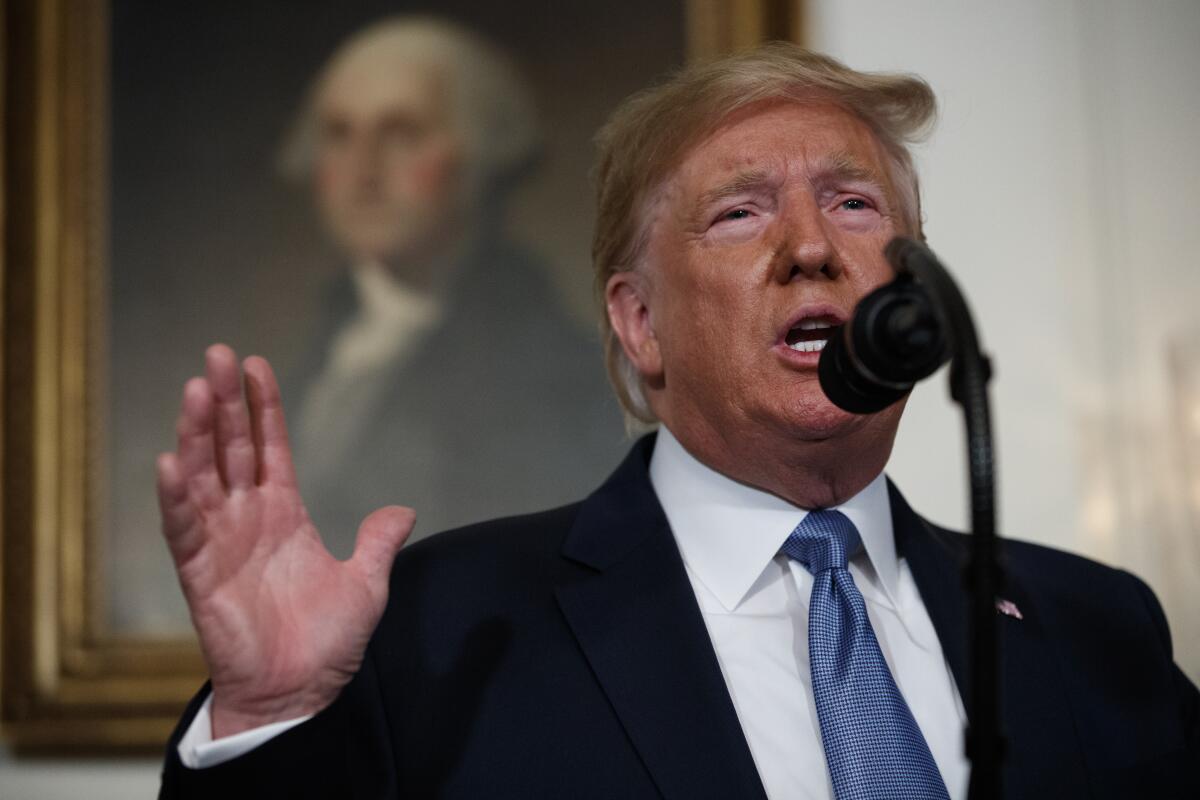Hands off the internet, President Trump

- Share via
In the wake of the president’s complaints about how Big Tech treats conservatives, the Trump administration is reportedly developing an executive order that would make a mockery of Republicans’ supposed reluctance to regulate the internet.
The inspiration for the order is the oft-repeated assertion by conservative pundits and pols (and echoed by the president himself) that Facebook, Twitter and other Big Tech companies are singling them out for censorship because the companies are supposedly pervaded by liberal bias — an argument based on anecdotes, not data. The companies insist they are doing no such thing, and that they’ve blocked content or users only when they’ve violated the companies’ terms of service.
The order’s target is a 1996 federal law that shields online companies from liability for the content uploaded by their users. Significantly, the law — known informally as Section 230 of the Communications Decency Act — allows companies to block or remove uploads that they judge to be “objectionable,” as long as they act “in good faith.”
According to CNN’s Brian Fung, who obtained a summary of the order, the administration wants the Federal Communications Commission to restrict the availability of that shield, potentially discouraging tech companies from taking objectionable material down or even penalizing them when they do.
“Under the draft proposal, the FCC will be asked to find that social media sites do not qualify for the good-faith immunity if they remove or suppress content without notifying the user who posted the material, or if the decision is proven to be evidence of anticompetitive, unfair or deceptive practices,” Fung wrote.
The order would also ask the Federal Trade Commission to “work with the FCC to develop a report investigating how tech companies curate their platforms and whether they do so in [politically] neutral ways.” Fung reported. The FTC would also invite complaints from the public about improper content moderation by large tech companies.
In other words, the administration is straining at the bit to regulate how social media networks decide what’s appropriate for their sites. To some tech advocates, that smacks of hypocrisy.
“Ironically, the same people screaming about ‘censorship’ by private companies would empower regulators to decide what kinds of online speech should and shouldn’t be taken down,” Berin Szóka, president of the libertarian-leaning TechFreedom, said in a statement Friday. “After denouncing President Obama for urging the FCC to adopt the strongest possible net neutrality rules, will Republicans now cheer as President Trump dictates how two independent agencies should enforce a bizarro version of net neutrality?”
Emma Llansó, a free speech expert at the Center for Democracy and Technology, noted that the draft order poses serious constitutional problems. “No part of the government can dictate a vague standard of ‘unfair content moderation’ and use it to punish websites for exercising discretion in deciding what speech to host,” she said in a statement. “An executive order giving the FTC such powers would raise significant 1st Amendment issues and would be quickly challenged in court.”
Which, frankly, is par for the course for this administration.
The order is still a work in progress, and there’s no guarantee it will be issued. But the draft is alarming because it buys into the revisionist history advanced by some of Big Tech’s fiercest critics on the right — specifically, that Section 230 was intended to protect only “neutral” tech platforms. I covered the legislation as it moved through Congress, and there was no such intent on the part of its authors, as they have since reiterated. To the contrary, the whole point of Section 230 was to encourage tech companies to take down content that their users would find offensive.
That’s inherently a judgment call, and it’s folly to think a politically appointed federal regulator could do that job better than the companies that are trying to attract users, not drive them off.
The silver lining here is that even if Trump issues the order, he doesn’t have the authority to tell the FCC and the FTC what to do. They don’t work for him. And while FCC Chairman Ajit Pai is a Trump appointee, he has also been a forceful opponent of the FCC regulating the internet. In fact, his position in the net neutrality debate has been that his agency has no such authority. So if he’s at all intellectually consistent, he will send any request from Trump along the lines of the draft order straight to his circular file.
More to Read
A cure for the common opinion
Get thought-provoking perspectives with our weekly newsletter.
You may occasionally receive promotional content from the Los Angeles Times.










